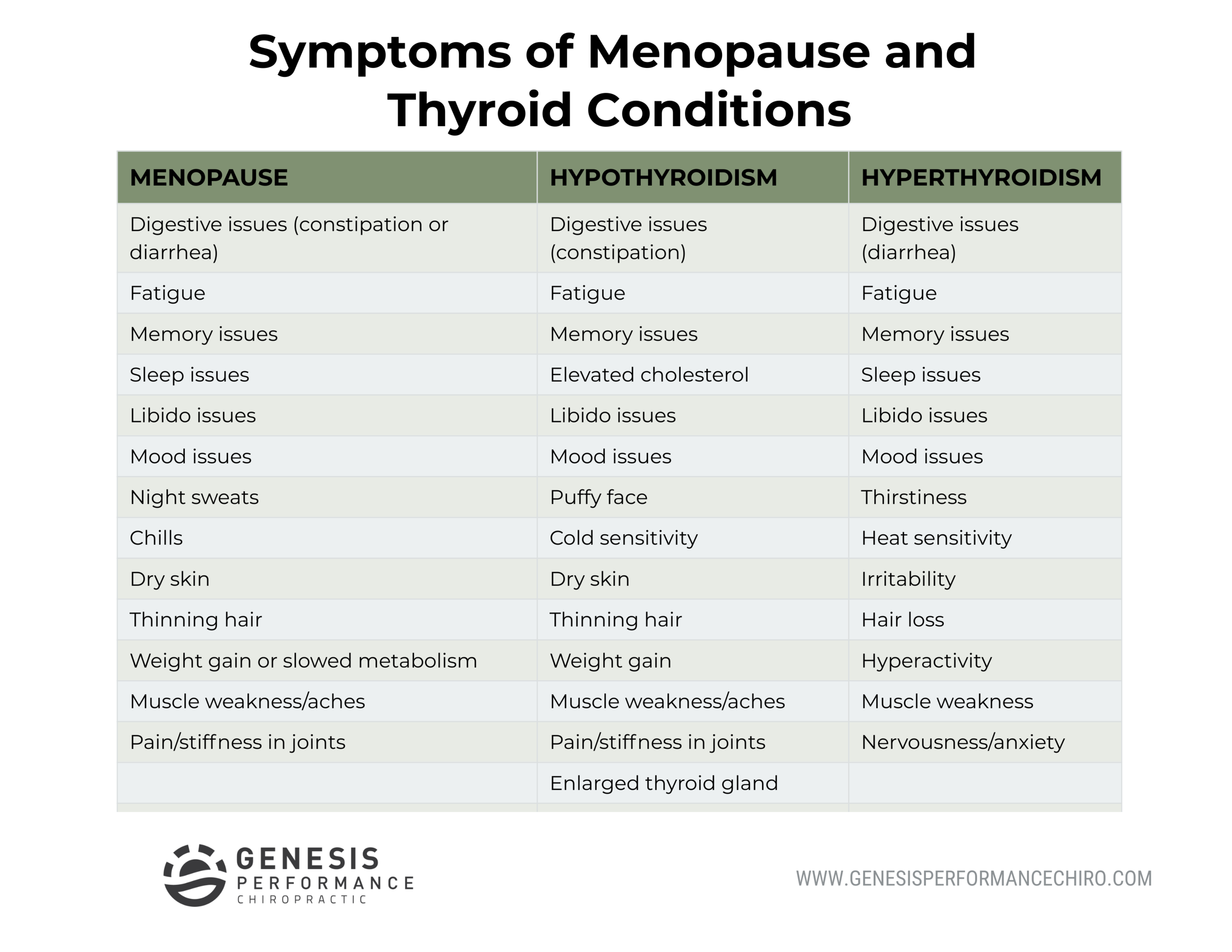Menopause and the Thyroid
If you’ve been following us, you know that we care a lot about the thyroid gland and its role in maintaining optimal wellness. We care so much about it because we’ve had personal experiences with its role in our health and that of our patients - both the extreme deterioration of health when the thyroid is not functioning properly, and then the restoration of health once supported.
As a reminder, the thyroid is a butterfly-shaped gland in the lower front of the neck. Its primary job is to produce hormones that regulate a variety of functions within the body, including metabolism, heart function, digestion, muscle control, bone maintenance, mood regulation, and brain development.
More and more people, especially women, are developing thyroid conditions, which include hypothyroidism and hyperthyroidism. Hypothyroidism occurs when someone has an underactive thyroid, which means that the body is not producing enough of certain important hormones. Hyperthyroidism occurs when someone has an overactive thyroid. In this condition, the thyroid is producing too much of T3, T4, or both.
It’s also possible to have an autoimmune condition, such as Hashimoto’s or Graves’ disease. This is when the immune system is attacking and destroying the thyroid.
The Thyroid in Postmenopausal Women
We know that thyroid conditions mostly affect women. We also know that the incidence of thyroid conditions increases with age. Conditions such as autoimmune thyroid disease, hypothyroidism, nodular goiter, and cancer happen most often in elderly and postmenopausal women (1). However, identifying thyroid conditions in postmenopausal women can be tricky as many thyroid condition symptoms overlap with menopausal symptoms and ovarian dysfunction. Additionally, interpretation of thyroid tests can be more complicated in the older population (1). We recommend a number of thyroid tests to see if the thyroid is functioning properly.
It’s also important to note that iodine may play a role in thyroid health. Iodine is an important element that is needed for thyroid hormone production. Up to a third of people worldwide are at risk for iodine deficiency disorders (2). Unfortunately, not only does iodine intake matter, but iodine uptake also matters. As we age, the thyroid’s ability to uptake iodine decreases. In people over 80 years old, its ability is 40% less than those who are 30 years old. Iodine levels should always be checked to ensure that dietary intake is enough to support the production of thyroid hormones.
When menopausal and postmenopausal women are having symptoms, it’s tricky to tease out if symptoms are related to menopause or a thyroid condition. Check out our chart below to see how similar they can be.
Does Menopause Have an Effect on the Thyroid?
We know that symptoms caused by menopause are primarily due to all of the hormonal changes that occur with menopause. One of the primary hormones we’ve discussed is estrogen and how the decrease of estrogen during and after menopause leads to a variety of issues and symptoms in the body.
The decrease in estrogen also plays a role in thyroid health. Some data suggests that estrogen can play a role in how thyroid receptors allow thyroid hormones to enter into cells, affecting cellular and thyroid function (3). More research is needed to explore the relationship between estrogen levels, thyroid receptors, and thyroid health.
Does Thyroid Health Have an Effect on Menopause?
Women with compromised thyroid health may also have more severe menopausal symptoms. In a research study with 350 women with menopausal symptoms, 21 women had hypothyroidism and 18 women had hyperthyroidism. These women experienced much improvement in menopausal symptoms after being treated for their thyroid conditions (4).
Thyroid conditions may also increase the risk of menopausal complications. For example, osteoporosis is a concern during menopause as well as a concern with hypothyroidism (5). With menopause AND hypothyroidism, there is even more of a concern. The same is true of cardiovascular disease and heart conditions. Heart conditions are an issue with hypothyroidism (6) and with menopause, and the combination of the two is concerning for the body.
Additionally, as noted in our previous hormones article, during menopause, the body relies more on the adrenal gland for proper hormone function. If there is a thyroid condition, the body will rely even more on the adrenal gland, which can be very problematic. Researchers have established a relationship between thyroid health and adrenal gland health (7). Certain autoimmune conditions can destroy both the thyroid gland and adrenal cortex which can cause hormone deficiencies (8). Beyond autoimmune conditions, researchers are studying how the underproduction or overproduction of thyroid hormone can affect adrenocortical hormone deficiency or adrenocortical hormone excess (9). More research is needed in order to fully understand this relationship.
Clinically, we see a higher incidence of thyroid conditions in menopausal women. As mentioned before, we already know that menopausal women may have an iodine deficiency due to inadequate iodine intake or a reduced iodine uptake ability. Additionally, we suspect that decreases in estrogen levels affect how thyroid hormones are able to enter cells in the body.
We also know that women often have subclinical thyroid conditions. While their thyroid lab ranges appear to be normal in conventional testing, when we dig deeper, we find that the thyroid is not working optimally. Subclinical thyroid conditions may have some of the same symptoms as having a clinically recognized thyroid condition (and similar symptoms to menopause). As a rule of a thumb, we don’t wait for the person to fall apart to act. If a thyroid issue is suspected, we run a variety of thorough tests, including labs and imaging, to verify the issue and address it.
Bottom line- it’s important to get your thyroid thoroughly checked out and supported, if needed. Improving and restoring thyroid function will play an invaluable role in supporting your body during menopause. Supporting the thyroid will improve your overall health as well as menopausal symptoms. Please call our office if you’re experiencing symptoms that you think might be related to menopause and/or a thyroid condition so we can help.
Works cited:


